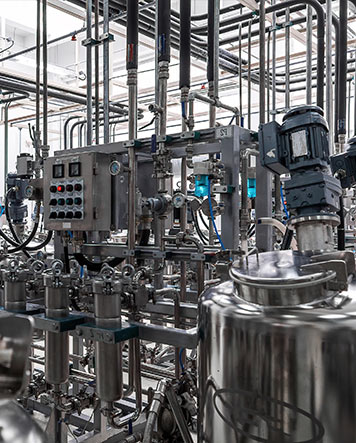PLCs and DCSs in the Chemical Industry: Precision, Safety, and Efficiency in Complex Processes
Introduction
The chemical industry encompasses a vast range of processes, from the production of basic chemicals to specialty chemicals, pharmaceuticals, and polymers. These processes often involve hazardous materials, precise control requirements, complex reactions, and stringent safety regulations. Programmable Logic Controllers (PLCs) and Distributed Control Systems (DCSs) are indispensable automation technologies that play a critical role in ensuring safe, efficient, and reliable operations in chemical plants. This article explores the diverse applications of PLCs and DCSs within the chemical industry.
PLC Applications in Chemical Manufacturing
PLCs are widely used for discrete control tasks, managing individual machines, and handling batch processes within chemical plants:
- Batch Reactor Control: PLCs are ideal for controlling batch reactors, which are used for many chemical processes. This includes:
- Ingredient Charging: Precise control of valves, pumps, and feeders to add the correct amounts of reactants.
- Agitation Control: Controlling the speed and operation of agitators to ensure proper mixing.
- Temperature Control: Precise temperature control during the reaction, often involving heating and cooling cycles.
- Pressure Control: Maintaining the correct pressure within the reactor.
- Sequencing and Timing: Executing the precise sequence of steps in the batch process.
- Safety Interlocks: Implementing safety interlocks to prevent unsafe conditions.
- Material Handling: PLCs control conveyor systems, pumps, valves, and other equipment used to transport and handle raw materials, intermediates, and finished products.
- Packaging and Filling: PLCs manage automated packaging and filling lines for chemical products.
- Safety Systems: PLCs are often used in safety instrumented systems (SIS) to monitor critical parameters and initiate emergency shutdowns if necessary. This is distinct from the main process control, and often uses specialized, safety-rated PLCs.
- Discrete Machine Control: PLCs control individual machines such as pumps, compressors, centrifuges, and extruders.
DCS Applications in Chemical Manufacturing
DCSs are employed for continuous process control, plant-wide integration, and overall system management in chemical plants:
- Continuous Reactor Control: DCSs are essential for controlling continuous reactors, which are used for large-scale production of chemicals. This involves:
- Flow Control: Precise control of flow rates of reactants and products.
- Temperature Control: Maintaining the optimal temperature profile within the reactor.
- Pressure Control: Regulating the pressure within the reactor.
- Level Control: Maintaining the correct levels of liquids or solids in vessels.
- Composition Control: Monitoring and controlling the composition of the reaction mixture.
- Distillation Column Control: DCSs are used to control distillation columns, which are used to separate different components of a mixture based on their boiling points. This involves controlling:
- Reflux Ratio: The ratio of liquid returned to the column to liquid withdrawn as product.
- Reboiler Duty: The amount of heat supplied to the reboiler.
- Feed Temperature and Flow Rate: The temperature and flow rate of the feed entering the column.
- Column Pressure: The pressure within the column.
- Plant-Wide Utilities: DCSs manage plant-wide utilities, such as steam, cooling water, compressed air, and power generation.
- Environmental Monitoring and Control: DCSs monitor emissions and control pollution control equipment (scrubbers, incinerators) to ensure compliance with environmental regulations.
- Advanced Process Control (APC): DCSs often incorporate APC techniques, such as model predictive control (MPC), to optimize process performance and improve efficiency.
- Alarm Management: DCSs provide sophisticated alarm management capabilities to alert operators to abnormal conditions and prevent incidents.
Hybrid Systems and Integration (PLCs and DCSs)
The chemical industry commonly uses hybrid systems, combining the strengths of PLCs and DCSs:
- PLC for Local Control: PLCs handle the fast, discrete control of individual machines and batch processes.
- DCS for Overall Coordination: The DCS oversees the entire production process, manages plant-wide utilities, and provides a unified platform for monitoring and control.
- Data Exchange and Communication: PLCs and DCSs communicate with each other, exchanging data and coordinating operations. This ensures seamless information flow and optimized performance.
- MES/ERP Integration: Both PLCs and DCSs can be integrated with Manufacturing Execution Systems (MES) and Enterprise Resource Planning (ERP) systems. This provides real-time data for production planning, scheduling, inventory management, quality control, and regulatory compliance.
Benefits of PLCs and DCSs in the Chemical Industry
- Enhanced Safety: Automation reduces the risk of human error and improves workplace safety, particularly in handling hazardous materials. Safety interlocks and SIS systems are crucial.
- Improved Product Quality and Consistency: Precise control ensures consistent product quality and reduces batch-to-batch variability.
- Increased Production Efficiency: Automation reduces cycle times, increases throughput, and minimizes downtime.
- Optimized Resource Utilization: DCSs help to minimize energy consumption, raw material waste, and operating costs.
- Regulatory Compliance: DCSs facilitate compliance with stringent environmental and safety regulations.
- Data-Driven Decision Making: Real-time data from PLCs and DCSs provides valuable insights for process optimization, predictive maintenance, and continuous improvement.
- Scalability and Flexibility: PLC and DCS systems can be easily scaled and adapted to accommodate changes in production requirements or new product development.
Conclusion
PLCs and DCSs are essential technologies for the modern chemical industry. They provide the automation, control, and integration capabilities needed to manage complex processes, ensure safety, improve efficiency, and meet stringent regulatory requirements. The trend towards hybrid systems, advanced process control, and greater integration with MES/ERP will continue to drive innovation and optimization in the chemical industry. The focus on safety and reliability makes the selection and implementation of these systems particularly critical in this sector.
 中文版
中文版






